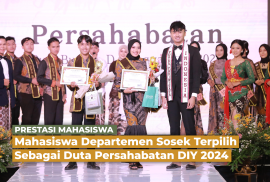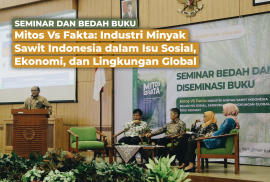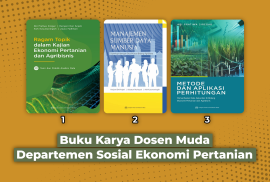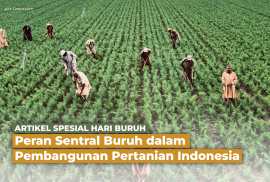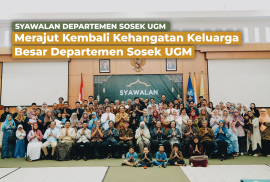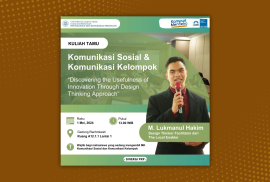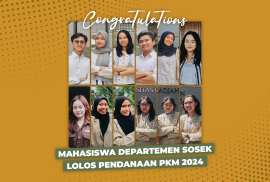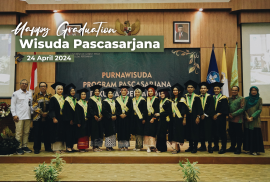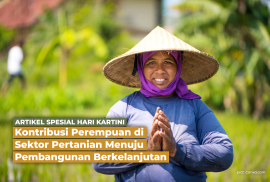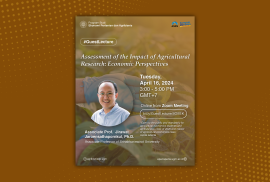The Department of Agricultural Socioeconomics, Faculty of Agriculture, Gadjah Mada University (UGM), is thrilled to share the outstanding achievements of Havidah Tria Yunita, a student of the 2021 Agricultural Extension and Communication Study Program. Tria’s recent appointment as the 2024 Yogyakarta Special Region Friendship Ambassador is a testament to her unwavering passion for exploring and promoting Yogyakarta’s rich cultural heritage. Her dedication and enthusiasm are truly inspiring.
On Saturday, May 4, 2024, the Student Family of the Department of Agricultural Socioeconomics (KMSEP) at Gadjah Mada University, in collaboration with the Palm Oil Agribusiness Strategic Policy Institute (PAPSI) and the Palm Oil Plantation Fund Management Agency (BPDPKS), hosted a book review seminar titled “Myths vs Facts: Indonesian Palm Oil Industry in Global Social, Economic and Environmental Issues, Fourth Edition.” This event, graced by 221 participants, including esteemed figures from the industrial and academic sectors, aimed to foster a deeper understanding of the palm oil industry. Notable attendees included Dr. Ir. Tungkot Sipayung (Executive Director of PAPSI), Eddy Abdurrachman (Main Director of BPDPKS), and leading lecturers from Gadjah Mada University such as Dr. Dyah Woro Untari, Prof. Dr. Jamhari, Dr. Siti Mutiah Setiawati, and Prof. Dr. Ir. Sri Raharjo.
Recently, several young lecturers from the Department of Agricultural Socioeconomics, Faculty of Agriculture, Gadjah Mada University, released three inspiring books. This achievement not only reflects the dedication and competence of young lecturers in the Department of Agricultural Socioeconomics but is also a significant marker in the current development of Agricultural Economics and Agribusiness. With passion and in-depth knowledge, our lecturers have produced work that has the potential to become a major pillar in academic literature in their field.
Labor Day, celebrated every May 1, is a moment to honor the significant contributions of workers in various sectors, including agriculture. When the sun was dawning in different parts of Indonesia, thousands of agricultural workers began to enter the fields with unparalleled enthusiasm. From morning until dusk, they serve, plowing, planting, caring for, and harvesting the land with complete dedication. Their role not only includes physical tasks but also acts as a bridge between agricultural land and national food needs.
On Saturday, April 27, 2024, an atmosphere of togetherness and warmth colored the Hardjono Danoesastro Auditorium, Faculty of Agriculture, Gadjah Mada University (UGM). The Syawalan of the Department of Agricultural Socioeconomics activities was finally held again after being stopped due to the COVID-19 pandemic. Attended by the entire extended family of the Department of Agricultural Socioeconomics, including students, lecturers, teaching staff, and other important figures, this activity was not just a routine gathering but also a special moment to reunite in warmth and togetherness.
The Agricultural Extension and Communication study program held a Guest Lecture on Social Communication and Group Communication courses with the theme: Discovering the Usefulness of Innovation Through Design Thinking Approach.
With speaker:
🎙 : M. Lukmanul Hakim
- The Local Enabler Facilitator
📅 : Wednesday, May 1, 2024
🕘 : 13.00 WIB
📌: Room A12.1.1, 1st Floor Rachmiwati Building
This Guest Lecture is MANDATORY for students taking Group Communication and Social Communication classes
Student Creativity Week in 2024 will be held again. Recently, students from the Department of Agricultural Socioeconomics again made a proud achievement because they succeeded in qualifying for funding for the 2024 Student Creativity Program. From various fields, they have succeeded in turning their innovative ideas into actual work that benefits the surrounding community and has great potential to support sustainable development in multiple sectors. The following is a list of teams and students who successfully passed the 2024 Student Creativity Week:
On April 24, 2024, the Faculty of Agriculture, Gadjah Mada University, celebrated the Period III Postgraduate Program Graduation ceremony at the Hardjono Danoesastro Auditorium, Faculty of Agriculture UGM. This event marked the successful completion of academic journeys for 44 male and female graduates from 9 postgraduate programs, a collective achievement that we all can be proud of.
The Department of Agricultural Socioeconomics also contributed brilliantly by graduating 15 graduates from two of its superior programs. The Master’s Program in Agricultural Economics graduated one graduate, while the Master’s Program in Agribusiness Management graduated 14 graduates. This outstanding achievement indicates the Department of Agricultural Socioeconomics’ commitment to producing future leaders who are competent in their fields.
Commemoration of Kartini Day on April 21 every year is not only a moment to remember Kartini’s service and fighting spirit but also to reflect on the role of women in various sectors of life, including the agricultural sector. Women often hold significant roles in this sector. In agricultural commodity cultivation activities, women also contribute to planting, caring for plants, and even harvesting. Apart from that, at the post-harvest stage, women are also involved in raising livestock, processing agricultural products, and marketing products.
The Agricultural Economics and Agribusiness study program held a Guest Lecture with the theme: Assesment of the Impact of Agricultural Research: Economic Perspectives.
With speaker:
🎙 : Prof. Jirawat Jaroensathapornkul, Ph.D.

